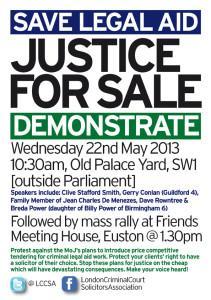Breda Power’s father Billy spent sixteen years in prison as one of the Birmingham Six (1975-1991), for an IRA bombing of which he was eventually shown to be innocent. Campaigning for his release she spoke frequently on the media and at meetings. When he and the other five walked out of prison, one of her first thoughts was that she never had to speak in public again.
“Twenty years later, here I am, again speaking for justice,” she said to a demonstration of lawyers, NGOs and other…


